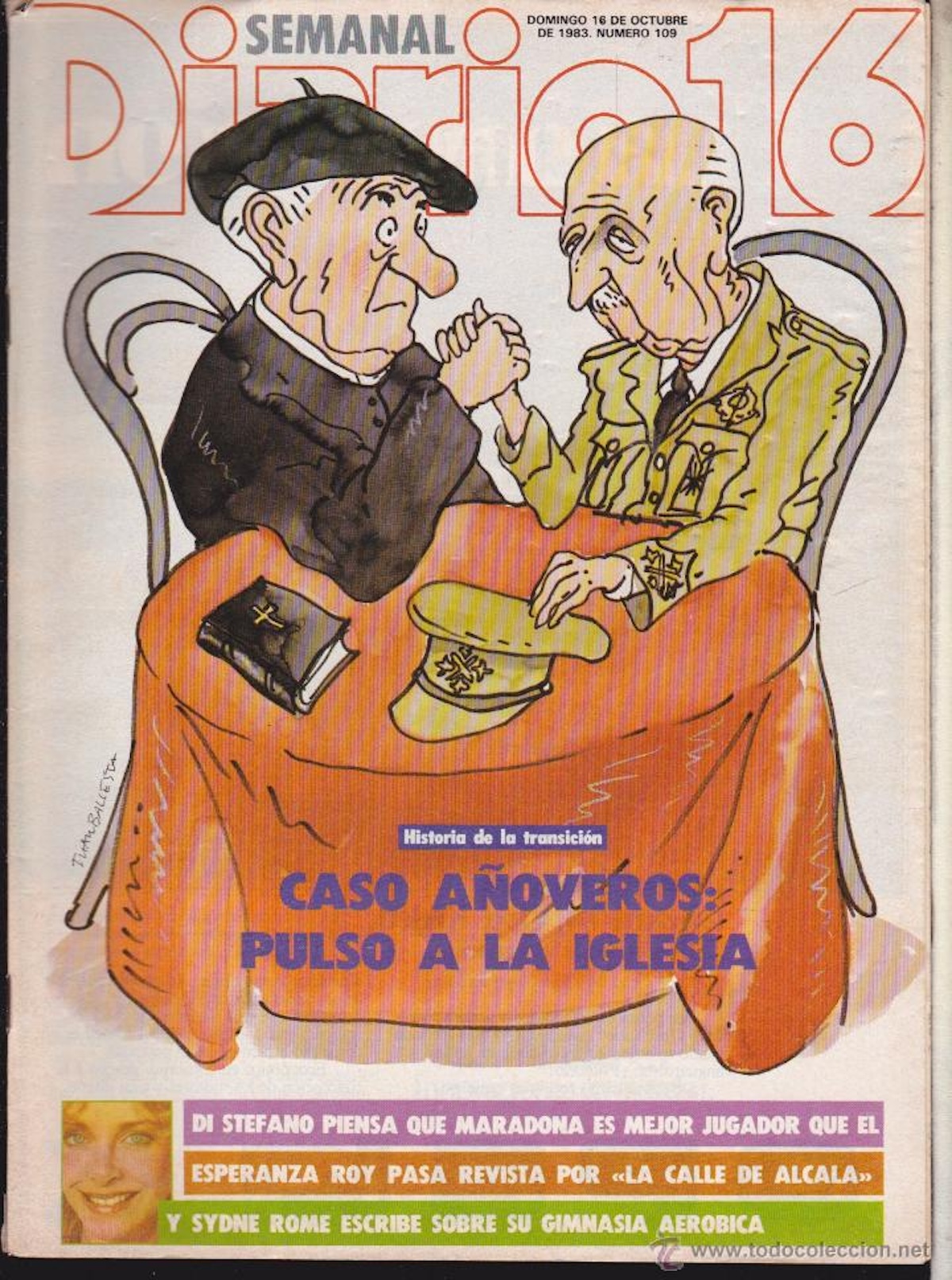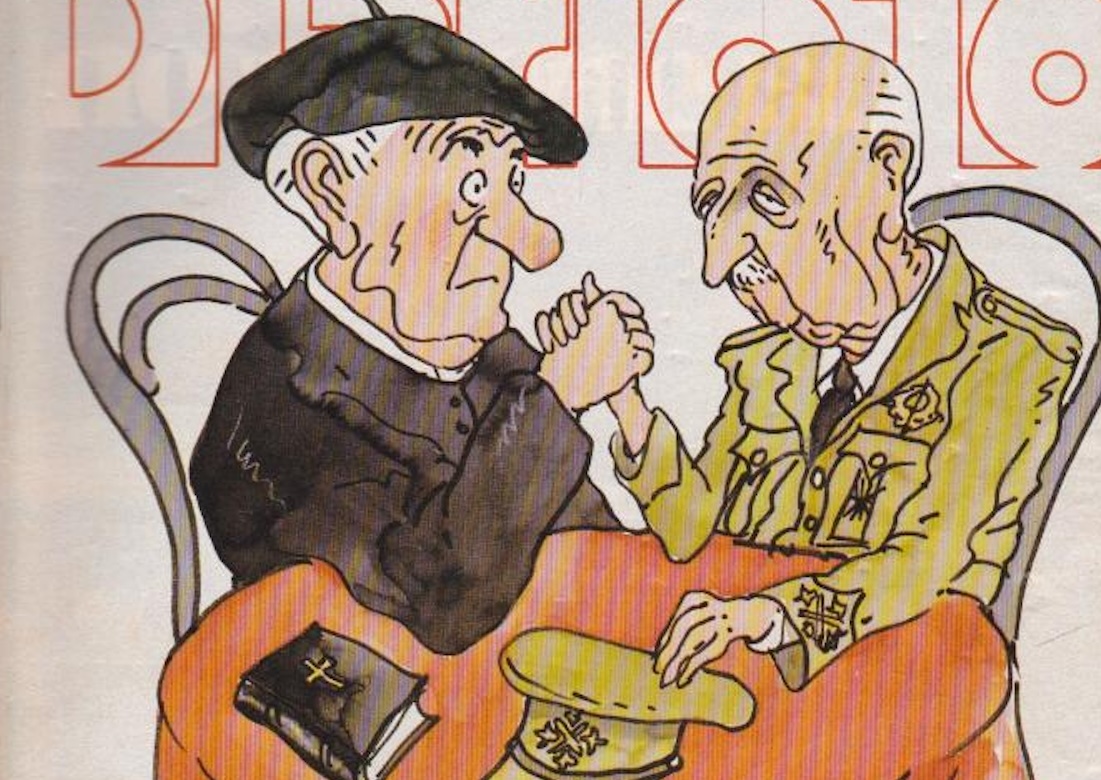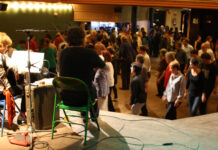February 24th marked fifty years since all the churches in the Diocese of Biscay read a homily Monsignor Antonio Añoveros, the Navarrese Bishop of Bilbao, titled “Christianity, Message of Salvation for the Peoples.” This anniversary seems to have gone by relatively unnoticed, despite its great historic importance. We only remembered it thanks to the Portuguese website Sete Margens (eskerrik asko).
The text of this homily, which you can find below, when seen from a modern perspective, fifty years later, can’t help but come across as “hardly controversial.” But at the beginning of 1974, it set off an apocolyptic-level explosion among the very “Roman Apostolic Catholic” government of the Franco dictatorship, with the dictator himself as its head, and a Spanish Church that was just beginning to make references to the Second Vatican Council.
It’s true that for the Basque church in general, and for the Bishop of Bilbao in particular, the principles cited in that Council, which ended in 1965, and the Church’s Social Doctrine (which began to be defined by Pope Leon XIII’s encyclical Rerum Novarum in 1891), were no novelties.
Regarding this commitment, we can’t help but remember Basque missionaries. A clear example of this was Ignacio Ellacuria, the Portugalete-born Bishop of El Salvador and one of the UCA martyrs. He explained, with more than a touch of sarcasm:
“They sent us to the Americas because in the Basque Country we could have been small-scale “revolutionaries” … and in the Americas, we became partisans of a universal revolution, in line with Christian freedom.”
And in the Deia article by Félix García Olano about Monsignor Añoveros that we link to below, we can easily see that this was nothing new to him:
“For him, this Council had meant retraining as a bishop. Don Antonio wanted his thoughts and decisions to be made from a council-based point of view. The more progressive sectors of the Spanish Church called him the Spanish Helder Camara, because some of his writings and decisions recalled the Brazilian bishop.”
But none of this should be taken to mean that the relationship between an important part of the Basque Church and the Franco régime was very good. We mustn’t forget the priests who suffered capital punishment or were just straight-up murdered by Franco’s régime, as well as those who were deported (officially, to other places in Spain or abroad to the missions), or those who ended up in prison.
But never before had such a crisis between the Spanish ecclesiastical hierarchy and the dictator’s government been seen.
To understand the situation that arose from this, we must recall that:
-
- On the one hand, the government run by Franco gave the order to expel the Bishop of Bilbao and his Vicar General. He was arrested by the police, and a plane was even waiting for them at Bilbao Airport to fly them out of Spain.
- On the other hand, the Bishop of Bilbao refused to leave, and a diplomatic conflict arose between the Franco government and the Church, first that of Biscay, then that of Spain, and finally the Holy See. There was a moment when notice was given that the Añoveros’ expulsion would result in the excommunication of the person responsible for it, who at that time was the president of the Council of Ministers himself, Carlos Arias Navarro.
This is what came to be known as the Añoveros Case. (machine translation into English)
So, as we said, this Saturday was the 50th anniversary of the reading of this homily in almost all the churches in Biscay. We say almost, because some of the priests refused to read it, undoubtedly because they felt more Francoist than priests.
We also forgot, and we were reminded by Manuel Pinto in his article on the website Sete Margens, and in an article by Josep Miquel Bausset on the website Religión Digital, which we also link to below.
We’re also including the complete text of that homily, copying the text sent to all the churches in Biscay to be read, which is available on the Fundación Sancho el Sabio website, and a transcription.
We’ll start with a video the Diocese of Bilbao itself filmed, explaining what happened and giving it context.
Deia – 22/2/2014 – Euskadi
Cuarenta años del ‘caso Añoveros’: Félix García Olano
Hace cuarenta años, la Iglesia de Bizkaia, encabezada por monseñor Añoveros, y el régimen de Franco chocaron por una catequesis que abordaba el ‘problema vasco’; el obispo estuvo a punto de ser expulsado y el Gobierno, de ser excomulgado. Un reportaje de Félix García Olano en DEIA.
We also reference the text of the article on the website Arratia Eliza
(Follow) (Automatic translation)
Sete Margens – 25/2/2024 – Portugal
50 anos do “Caso Añoveros”: quando a Igreja Católica afrontou o regime de Franco


Foi há 50 anos: com o franquismo já em fase declinante, um bispo defendeu o direito do povo basco à sua identidade, o governo de Franco quis expulsá-lo e a crise que se desencadeou foi de tal envergadura que esteve iminente o corte de relações entre a Espanha e o Vaticano. Essa crise, considerada a mais grave entre a Igreja Católica e o regime totalitário espanhol, ficou conhecida como “o caso Añoveros”.
(Follow) (Automatic translation)
Religión Digital – 24/2/2024 – Spain
El caso Añoveros: En la Iglesia no se puede ser imparcial
“Hoy se cumplen 50 años del llamado ‘caso Añoveros’, que se produjo debido a la lectura de la homilía del obispo de Bilbao, Antonio Añoveros, un episodio que originó el enfrentamiento más grave entre el franquismo y la Iglesia”
(Follow) (Automatic translation)
Text of the homily
CHRISTIANITY: MESSAGE OF SALVATION FOR ALL PEOPLES
Homily by Monsignor Antonio Añoveros, Bishop of Bilbao, read in all the churches in Biscay on February 24, 1974
A serious pastoral problem:
One of the problems that most seriously harms the citizens’ living together in the Basque Country, and which likewise affects the proper functioning of our diocesan church, is the so-called Basque problem. What exactly is this problem?
Boiling it down to its essence, it can be expressed thus: while some groups of citizens, though with different nuances, claim there exists an oppression of the Basque people and demand the practical recognition of its rights, other groups reject that accusation, outraged, and proclaim that any attempt to modify the established situation constitutes a serious attack on social order.
This problem, within certain limits, enters into the field of the evangelizing mission of the diocesan church. We were recently reminded of this by Pope Paul VI:
“The Catholic Church takes very seriously the rights of people and the peoples, and likewise the conditions of freedom, of dignity, of ethnic equality, of justice, of responsibility, that are required for their full enjoyment.”
ECCLESIA. July 22, 1972, p. 15).
That is why we are here today to offer all citizens, particularly believers who sincerely wish to inspire their behavior on the Gospel, some Christian criteria to serve two purposes:
-
- To achieve greater fidelity of God’s people in Biscay with the Christ’s Plan for Salvation for our society.
- To contribute to the creation of citizens’ living together based on justice, love, truth, and freedom.
Christianity: Message of Salvation for the Peoples.
The Church of Christ is a visible and effective sign of salvation for all men. But a human being is born in a people, receives from it language, culture, traditions, in a word, its spiritual face. People make peoples; but, at the same time, peoples shape people. Each people is a sample of the inexhaustible power of creation of the human spirit.
That is why salvation, as integral liberation of the human person, is inseparable from the liberation of the people to which the person belongs. Because peoples are a constitutive part of the people that make them up. A person separated from his people is like a tree whose original roots have been cut.
The social and political dimension of Christian salvation affects not only people but also ethnic groups and different peoples, as they are the collective expression of a community of human persons.
That is what the Church of Christ explains, as it is called to proclaim and make present salvation in the midst of the world, announces and demands the liberation of oppressed peoples.
“We reaffirm,” say the bishops in the 1971 Synod, “the right of peoples to conserve their own identity.”
(Bishops’ Synod of 1971. p. 60, Sígueme Publishers).
And Pope John XXIII, in his Encyclical “Peace on Earth,” specified the content of that right:
“It is quite clear that any attempt to check the vitality and growth of these ethnic minorities is a flagrant violation of justice; the more so if such perverse efforts are aimed at their very extinction.
Indeed, the best interests of justice are served by those public authorities who do all they can to improve the human conditions of the members of these minority groups, especially in what concerns their language, culture, ancient traditions, and their economic activity and enterprise.”
(№ 95–96).
On occasions, peoples, or rather the ruling classes of peoples, who decide their fate, can yield to the temptation to sacrifice the individual characteristics and values of the country itself for the advantages offered by simple economic growth.
Such a decision, inspired by the calculation and profit of a few ruling classes, deserves clear disapproval
“Every country, rich or poor, has a cultural tradition handed down from past generations. This tradition includes institutions required by life in the world, and higher manifestations— artistic, intellectual and religious—of the life of the spirit. When the latter embody truly human values, it would be a great mistake to sacrifice them for the sake of the former.
Any group of people who would consent to let this happen, would be giving up the better portion of their heritage; in order to live, they would be giving up their reason for living.
Christ’s question is directed to nations also: “What does it profit a man, if he gain the whole world but suffer the loss of his own soul? (Matthew 16:26)”
(Paul VI: Encyclical “The Development of Peoples,” № 40),
The right of peoples to conserve their identity also includes the faculty to be in possession of a socio-political organization that protests and promotes its just freedom and its collective personality.
Political unity does not mean uniformity.
The State must be at the service of people and the peoples, and must sincerely respect the social and cultural pluralism that exists in a country.
It is not a function of the Church, but rather the citizens, to set the technical formula that allows for the rights and duties of diverse peoples within the framework of the State or of international political organizations to be coordinated.
From the moral point of view, the Church only affirms the principle that, for this formula to be fair and to ensure peaceful coexistence, it must be the result of a sincere civic dialogue and not the fruit of an imposition of stronger groups upon weaker ones.
The liberation of peoples and their development in solidarity within the human family is also a demand of the universality or catholicity of Christianity. Christianity does not identify with a determined culture or civilization, but rather must take root in all of them, revealing the ultimate meaning of all true human value.
“The Church, in order to be able to offer all of them the mystery of salvation and the life brought by God, must implant herself into these groups for the same motive which led Christ to bind Himself, in virtue of His Incarnation, to certain social and cultural conditions of those human beings among whom He dwelt.”
(Decree “Ad Gentes,” № 10).
For this reason, the Church would commit an outrage against the dignity of a people, and would be faithless to its mission, if it tried to announce the Gospel by using some cultural expressions that are foreign to its way of being.
On the other hand, “In order that they may be able to bear more fruitful witness to Christ, … let them acknowledge themselves to be members of the group of men among whom they live; let them share in cultural and social life…; let them be familiar with their national and religious traditions; let them gladly and reverently lay bare the seeds of the Word which lie hidden among their fellows.” (Decree Ad Gentes. № 11).
Friendship and collaboration among peoples.
Finally, Christian salvation of the family of God, as reconciliation and construction, though imperfect on earth, calls for friendship and collaboration between the peoples, with mutual respect.
A people that closed in on itself and did not practice any exchange with cultures or traditions different to its own would trigger the human impoverishment of its members. But there is an instinctual mistrust by small groups of such calls to fairness, universality, and the preferred worry that drives them to protect their own personality.
“The Church declares, says Paul VI to the descendants of the ancient peoples of Oceania, that you, like other ethnic minorities, have all human and civil rights, just like those of the majority; so too do you have certain duties and obligations.
For the common good, this requires your activities to harmonize in a spirit of fraternity and collaboration, to the advantage of the society you belong to. Regarding this, however, this must be clear, and we wish to underscore it, that the common good should never serve as a legal pretext to harm the positive values of your particular way of life. Society itself is enriched with the presence of different cultural and ethnic elements.“
(Ecclesia, December 12, 1970).
Applications to our specific situation.
The Basque people has some unique cultural and spiritual characteristics, among which its ancient language stands out. These peculiar traits give the Basque people a specific personality, within the whole of peoples that make up the current Spanish state.
The Basque people, like other peoples in the Spanish state, has the right to preserve its own identity, cultivating and developing its spiritual heritage, notwithstanding a healthy exchange with neighboring peoples, within a socio-political organization that recognizes its just freedom.
However, in the current circumstances, the Basque people is held back by serious obstacles to its being able to enjoy that right. The use of the Basque language, in both teaching at all levels as well as in the media (press, radio, TV) is under egregious restrictions. Different cultural manifestations also also subject to discriminate control.
The Church, in order to announce and make present the salvation of Christ, in this specific situation in the diocese. must encourage and stimulate so that the situation of our people is appropriately modified, in accordance with the principles stated in the papal and council documents.
But the Church must start by practicing in its internal life that which it advises be set up in civil life. This means adjusting its pastoral and educational activity to the unique characteristics of the populations in which it must preach and teach in the faith.
We conclude by making ours the words of the last Bishops’ Synod:
“The mission of preaching the Gospel dictates at the present time that we should dedicate ourselves to the liberation of people even in their present existence in this world…We know that our denunciations can secure assent to the extent that they are an expression of our lives and are manifested in continuous action.“
(Bishops’ Synod, p. 74).
NOTE: As the Pastoral Vicar General stated in his January 28th letter, this third topic “must be read in its entirety.”
Last Updated on May 17, 2024 by About Basque Country





